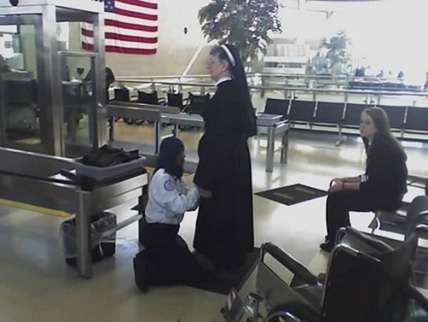Tom Friedman Writes a Post-Boston Bombing Op-Ed Straight Out of 2001
We may tell ourselves we don't let terrorists change us, but history indicates otherwise

The bombing of the Boston marathon is yielding the usual post-tragedy op-eds. The most important message after incidents like this is to not be terrorized. As Jesse Walker noted yesterday about the sociological aspect of tragedy response, the popular idea that people panic at the scene of a catastrophe but stay calm further from it is actually backward; it's the people far away from the immediate effects that are prone to panic. And with panic comes bad decision making. Witness the U.S. reaction to 9/11: a war in Afghanistan with no end-game that's lasted longer than the retributive mission for which it was started, a war in Iraq that had nothing to do with 9/11 (even though a significant percentage of Americans still think they're related), the PATRIOT Act, waterboarding, warrantless wiretapping, TSA body scanners, border checkpoints miles away from any border, stop and frisk, extrajudicial killings, and other erosions of our civil liberties. You'd have to be living under a rock or in your own security bubble not to notice these things. Enter Thomas Friedman, New York Times columnist:
We still do not know who set off the Boston Marathon bombs or why. But we do know now, after 9/11, after all the terrorism the world has seen in the last decade, what the right reaction is: wash the sidewalk, wipe away the blood, and let whoever did it know that while they have sickeningly maimed and killed some of our brothers and sisters, they have left no trace on our society or way of life. Terrorists are not strong enough to do that — only we can do that to ourselves — and we must never accommodate them.
This column is about 11 and a half years too late. Terrorists have profoundly changed America; the popular conception of rights, how wars are fought, our outlook at the rest of the world (books have literally been written on the subjects). Already the tragedy in Boston is being used by politicians to stop everything from the sequester to immigration reform.
Nevertheless, Friedman doubles down, continuing:
And while we are at it, let's schedule another Boston Marathon as soon as possible. Cave dwelling is for terrorists. Americans? We run in the open on our streets — men and women, young and old, new immigrants and foreigners, in shorts not armor, with abandon and never fear, eyes always on the prize, never on all those "suspicious" bundles on the curb. In today's world, sometimes we pay for that quintessentially American naïveté, but the benefits — living in an open society — always outweigh the costs.
It's as if he's writing about another country in another world. "We've been through 9/11. We probably overreacted then, but never again," Friedman adds, almost as an aside. But little of the post-9/11 reaction was rolled back. We may run in the open on our streets, for now, but we already have to take our shoes off and run a security gamut just to get on a plane. The TSA is now part of our Super Bowl tradition. New York City's famously liberal residents allow hundreds of thousands of stops of young black males to get a couple hundred guns off the streets (a rate much lower than 1 percent); meanwhile the consistent, long-term drop in the violent crime rate doesn't move us toward criminal justice reform, but a mass shooting will drive politicians to abrogate more of our rights. The NYPD gets twenty-something odd calls a day about suspicious packages, virtually always harmless. After the bombings in Boston, that number tripled. I'll agree with Friedman that American naïveté drives U.S. policy, but not the kind that embraces abandon and lacks fear but the kind that embraces fear and lacks abandon.


Show Comments (77)